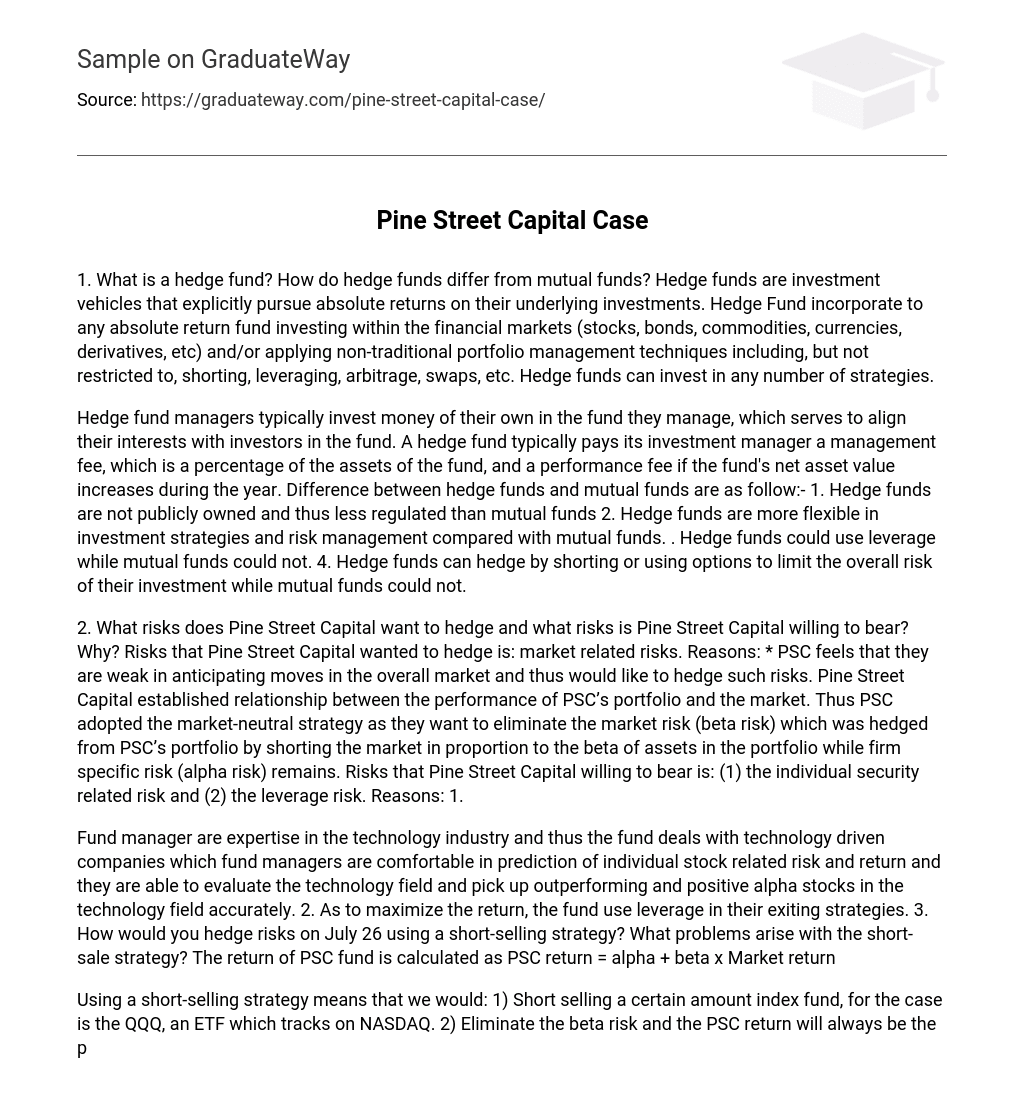1. What is a hedge fund? How do hedge funds differ from mutual funds? Hedge funds are investment vehicles that explicitly pursue absolute returns on their underlying investments. Hedge Fund incorporate to any absolute return fund investing within the financial markets (stocks, bonds, commodities, currencies, derivatives, etc) and/or applying non-traditional portfolio management techniques including, but not restricted to, shorting, leveraging, arbitrage, swaps, etc. Hedge funds can invest in any number of strategies.
Hedge fund managers typically invest money of their own in the fund they manage, which serves to align their interests with investors in the fund. A hedge fund typically pays its investment manager a management fee, which is a percentage of the assets of the fund, and a performance fee if the fund’s net asset value increases during the year. Difference between hedge funds and mutual funds are as follow:- 1. Hedge funds are not publicly owned and thus less regulated than mutual funds 2. Hedge funds are more flexible in investment strategies and risk management compared with mutual funds. . Hedge funds could use leverage while mutual funds could not. 4. Hedge funds can hedge by shorting or using options to limit the overall risk of their investment while mutual funds could not.
2. What risks does Pine Street Capital want to hedge and what risks is Pine Street Capital willing to bear? Why? Risks that Pine Street Capital wanted to hedge is: market related risks. Reasons: * PSC feels that they are weak in anticipating moves in the overall market and thus would like to hedge such risks. Pine Street Capital established relationship between the performance of PSC’s portfolio and the market. Thus PSC adopted the market-neutral strategy as they want to eliminate the market risk (beta risk) which was hedged from PSC’s portfolio by shorting the market in proportion to the beta of assets in the portfolio while firm specific risk (alpha risk) remains. Risks that Pine Street Capital willing to bear is: (1) the individual security related risk and (2) the leverage risk. Reasons: 1.
Fund manager are expertise in the technology industry and thus the fund deals with technology driven companies which fund managers are comfortable in prediction of individual stock related risk and return and they are able to evaluate the technology field and pick up outperforming and positive alpha stocks in the technology field accurately. 2. As to maximize the return, the fund use leverage in their exiting strategies. 3. How would you hedge risks on July 26 using a short-selling strategy? What problems arise with the short-sale strategy? The return of PSC fund is calculated as PSC return = alpha + beta x Market return
Using a short-selling strategy means that we would: 1) Short selling a certain amount index fund, for the case is the QQQ, an ETF which tracks on NASDAQ. 2) Eliminate the beta risk and the PSC return will always be the positive alpha. Based on the formula, the short-selling hedge is that for example, if the market now change by 10%, the portfolio changes by 10% multiple by beta. For example (see below Table 1) if today PSC want to hedge out its 100 value of stock portfolio, eliminating market risk from the long portfolio leaves the portfolio with a guaranteed 3. 5% return which is precisely the alpha of the long positions in the portfolio.
According to the Exhibit 10, the current share price of QQQ is $95. 62, thus number of shared need to short would be equal to market value of portfolio x portfolio beta / QQQ share price Refer to Exhibit 2, the market value of PSC portfolio at 26 July, 2000 is $34,553,800, PSC beta is 1. 67 and from Exhibit 10, the QQQ price is $95. 62. Substituting the figure, we could calculate that 603,481 shares are needed to short. A guaranteed hedged portfolio of 3. 5% return is achieved (Details, refer to Table 2). However, problems would arrive if the volatility increases significantly. This is because for the short-sale strategy. * it limited the upward potential gain when prices rises. * Besides, as the change in equity is significant as we need to short-selling a significant portion of investment in resulting the hedging return which might affect the Fund for further leverage. 4. Pine Street Capital is considering using options for its hedging program. How does options-hedging help with Pine Street Capital’s problems?
Instead of shorting, buy put options (using the options hedging), the return hedged portfolio would be equal to the guaranteed alpha, whether up or down movement. Options can better immunize against market fluctuations. Option hedging still keeping utilizing leverage and protect against large negative movement. From Exhibit 8, we would see that using option hedging for the past one and half year, the change in equity is much more stable using option hedging compared with the existing strategy – Short selling and also no hedge is carried out.





